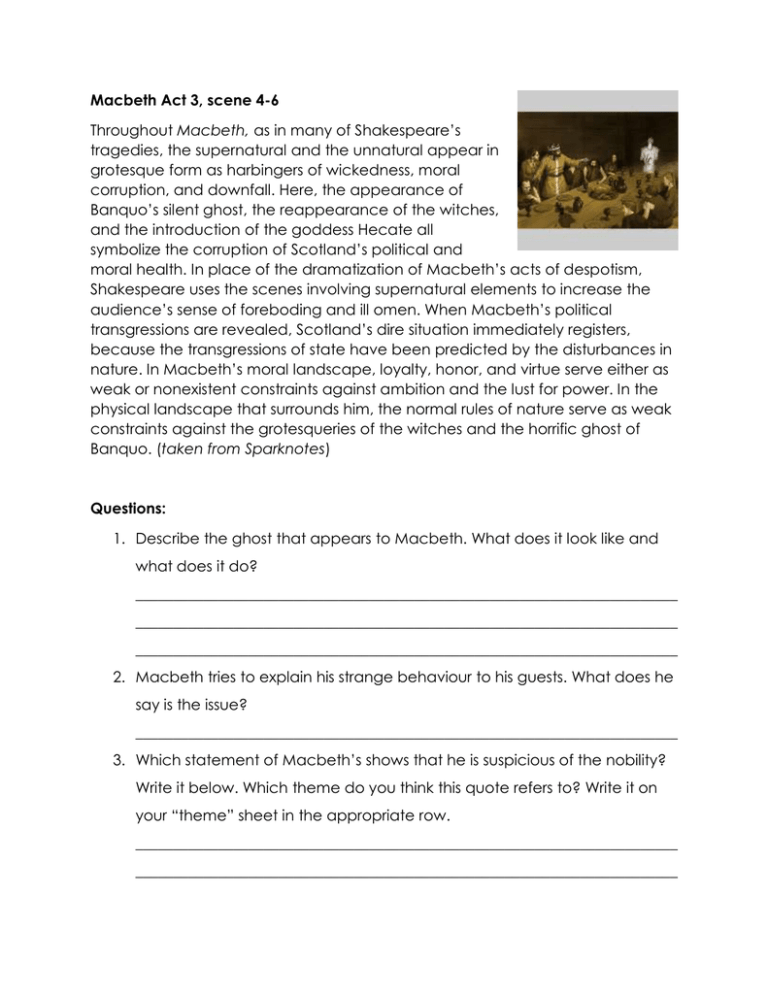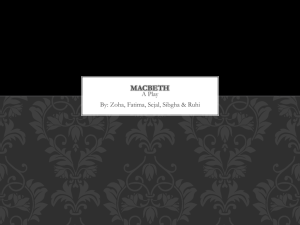Macbeth Questions Act 3.4-3.6
advertisement

Macbeth Act 3, scene 4-6 Throughout Macbeth, as in many of Shakespeare’s tragedies, the supernatural and the unnatural appear in grotesque form as harbingers of wickedness, moral corruption, and downfall. Here, the appearance of Banquo’s silent ghost, the reappearance of the witches, and the introduction of the goddess Hecate all symbolize the corruption of Scotland’s political and moral health. In place of the dramatization of Macbeth’s acts of despotism, Shakespeare uses the scenes involving supernatural elements to increase the audience’s sense of foreboding and ill omen. When Macbeth’s political transgressions are revealed, Scotland’s dire situation immediately registers, because the transgressions of state have been predicted by the disturbances in nature. In Macbeth’s moral landscape, loyalty, honor, and virtue serve either as weak or nonexistent constraints against ambition and the lust for power. In the physical landscape that surrounds him, the normal rules of nature serve as weak constraints against the grotesqueries of the witches and the horrific ghost of Banquo. (taken from Sparknotes) Questions: 1. Describe the ghost that appears to Macbeth. What does it look like and what does it do? ________________________________________________________________________ ________________________________________________________________________ ________________________________________________________________________ 2. Macbeth tries to explain his strange behaviour to his guests. What does he say is the issue? ________________________________________________________________________ 3. Which statement of Macbeth’s shows that he is suspicious of the nobility? Write it below. Which theme do you think this quote refers to? Write it on your “theme” sheet in the appropriate row. ________________________________________________________________________ ________________________________________________________________________ Summary: Act 3, scene 5 Upon the stormy heath, the witches meet with Hecate, the goddess of witchcraft. Hecate scolds them for meddling in the business of Macbeth without consulting her but declares that she will take over as supervisor of the mischief. She says that when Macbeth comes the next day, as they know he will, they must summon visions and spirits whose messages will fill him with a false sense of security and “draw him on to his confusion” (3.5.29). Hecate vanishes, and the witches go to prepare their charms. Summary: Act 3, scene 6 That night, somewhere in Scotland, Lennox walks with another lord, discussing what has happened to the kingdom. Banquo’s murder has been officially blamed on Fleance, who has fled. Nevertheless, both men suspect Macbeth, whom they call a “tyrant,” in the murders of Duncan and Banquo. The lord tells Lennox that Macduff has gone to England, where he will join Malcolm in pleading with England’s King Edward for aid. News of these plots has prompted Macbeth to prepare for war. Lennox and the lord express their hope that Malcolm and Macduff will be successful and that their actions can save Scotland from Macbeth.





